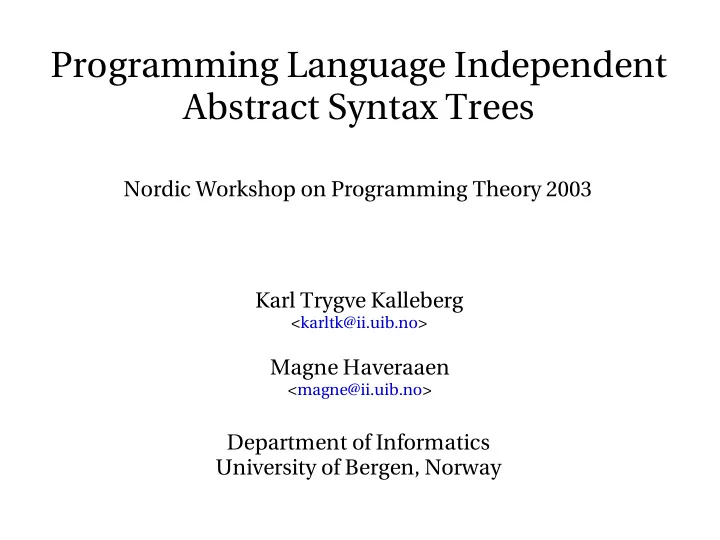

Programming Language Independent Abstract Syntax Trees Nordic Workshop on Programming Theory 2003 Karl Trygve Kalleberg <karltk@ii.uib.no> Magne Haveraaen <magne@ii.uib.no> Department of Informatics University of Bergen, Norway
Overview ● Motivation – Better understand common/emerging ● Programming concepts ● Language properties – Language tool interoperability ● Transformation ● Refactoring ● Approach – Analysis + synthesis formalism
CSTs and ASTs A = 42 + 23; Stmt Expr SEMI Assign BinaryOp Var Plus Expr EQUAL Expr BinaryOp Id Integer Integer A A Expr Expr PLUS 42 23 Integer Integer 42 23
Programming languages vs programming concepts language ( λ x. Display x) “Hello world” ++++++++[>+++++++++<-]>.<+++++[>++++++<-]>-.+++++++.. +++.<++++++++[>>++++<<-]>>.<<++++[>------<-]>.<++++[> ++++++<-]>.+++.------.--------.>+.
Language evolution ● New concepts expressed through – Idioms ● language-specific recipies – Patterns ● recipies common to a class of languages ● New concepts require – Adaptation to existing semantics – Possibly new syntax
Evolution: if + goto label: while (cond) { ... code ... ... code ... if (cond) goto label; } if (!cond) goto label1; if (cond) { ... code ... ... code ... goto label2 } else { label1: ... code ... ... code ... } label2:
Evolution: assertions ● Assertions in Java 1.4 if (!cond) throw new AssertionError(stringExpr); assert cond : stringExpr;
Evolution: contracts ● Pre/post conditions and class-invariants in Eiffel func(arg: TYPE) is require boolean-expression ... do body ... ensure boolean-expression ... end
Use case: CodeBoost Refine to obtain accurate information Perform transformation Emit code AST AST CST CST Source code CST CST Source code
Accurate information ● for(exp1; exp2; exp3) body; ● Undecideable termination ● Sugar for exp1; while(exp2){body; exp3;} ● for x in [1,2,3]: body ● Will always terminate ● map( λ x.body, [1,2,3])
Structuring and reuse ● Many concepts – Classes, inheritance, aspects, coordination, patterns, best practices ● Fewer constructs – package , class , template ● Experimentation easier at the abstract level – Not compounded by syntax – Allows domain-specific structuring
Conclusion ● Build more abstract AST using accurate information – Support language evolution in tandem with concept evolution – Increase convenience for tools – Simplify reasoning for programmer ● Not a new language! – Represented in contemporary languages
Recommend
More recommend